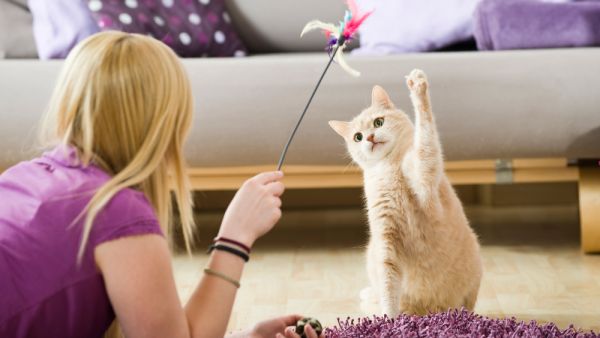Whether a woman playing tic-tac-toe with her cat, or neighbors singing together from their balconies, we’ve all seen videos of how people are trying to make light of the boredom of life under coronavirus lockdown.
But as the country deals with the “perfect storm” of coronavirus, economic meltdown and burnout from a monthslong protest movement, health professionals are offering advice on how to avert a brewing mental health crisis in Lebanon.
Four days into Lebanon’s official lockdown, stress marks from isolation and quarantine are already beginning to show. Distressed elderly people, deprived of their usual weekly visits from loved ones, have increasingly been calling the Embrace suicide prevention hotline, the hotline’s co-founder Mia Atoui told The Daily Star.
Quarantined coronavirus patients have also attempted to flee. “Yesterday, one of our COVID-19 patients tried to run away. He was stopped before he could leave, and gently convinced to go back,” the head of Rafik Hariri University Hospital Firas Abiad tweeted Monday. “Patients in isolation are under severe mental stress ... They are away from the comfort of their homes and the human interaction with loved ones.”
A February 2020 review of the psychological impact of quarantine found that it can have wide-ranging and potentially long-lasting effects. The study published in The Lancet medical journal reported that these can include post-traumatic stress symptoms, depression, and behavioral changes lasting up to six months after release.
STAYING CONNECTED AND SELF CARE
Quarantine, isolation and “social-distancing” reduce human interaction by varying amounts, but those with a history of mental health problems are particularly vulnerable.
“I have clients who are beginning to experience relapses of depression and anxiety as a result of staying at home for long periods of time,” Atoui said. “It often feels even more difficult to reach out [during isolation] because everyone seems overwhelmed with their own difficulties ... but staying connected is so important.”
Atoui recommends that people keep busy, stick to a specific schedule, and avoid saying in bed for long hours. Family members checking up on loved ones should use video calls too. “Make sure the person is actually up, rather than texting, as they might not be telling us exactly what they’re going through.”
“If you see a change in someone’s baseline, you should really pay attention to that,” the chairman of psychiatry and clinical psychology at St. George Hospital University Medical Center Dr. Georges Karam said. “Withdrawal, not eating, not sleeping or communicating well, and being tearful or sad all are symptoms of anxiety and depression.”
For those looking out for others during these testing times, level-headedness makes a good companion to heightened vigilance. Many Lebanese health professionals have been using the hashtag #HealthNerds on Twitter to share information that frames the conversation around coronavirus in more productive terms. Atoui is one of those contributors.
“The media often sensationalizes or induces panic about how the government is dealing with things for political reasons,” she said. “We’re trying to demystify, fact check, focus on scientific information and highlight things that we can do to take care of ourselves – rather than just sharing numbers and statistics about how bad coronavirus can get.”
“We must take a decision not to be vehicles of negative news,” Karam agreed.
This kind of decision, both as a form of self-care and consideration for those around us, is part of a series of steps that Karam says can soften the blow of prolonged isolation. The key here is planning and preparation.
“The biggest challenge is boredom. You need to start thinking ahead about how to fill your time,” Karam said, adding that the strategy you adopt will depend on your interests.
The Lebanese tendency to live with or in close proximity to their extended family can also help with boredom and reduce the temptation to break isolation. But it can equally be a curse.
“It’s important to respect each other’s privacy and boundaries and not get involved in other people’s affairs,” Karam said. “This message is mainly directed at Lebanese men ... who often start giving their wives a hard time because they are bored, getting involved in every detail of stuff the wife has been doing for 20 years without him realizing.”
Exercise is another essential component to staying sane while in isolation.
“I can’t emphasize enough how important exercise is on several levels,” Karam said. “It fills your time, reduces stress and helps your immunity so you become stronger to fight coronavirus. It will also counter the weight gain, now that everyone’s favorite activity is to sit at home and eat out of boredom.”
ONLINE CLASSES “CRAVED”
But while the government ordered most public and private institutions shut from March 16, most gyms have been closed since the ministerial committee responsible for combating coronavirus instructed them March 6 to shut their doors. Ever creative in the face of adversity, the Lebanese have moved their gym classes online.
Beirut-based fitness and Pilates instructor Rana Khalil has been leading online classes for nine days from her home.
“We should go slow and easy on ourselves now, which is why Pilates is good because it helps both physical and mental health,” she told The Daily Star. “Since everyone is at home now, without equipment or access to what they need, I decided to help. Half of my clients are online with me now.”
Zumba education specialist Eliana Bourgeili is also offering free virtual sessions from her home in Metn, connecting as many as 50 people online at one time.
“The experience was really nice, to reconnect. They told me it was the best thing they’ve done during this period,” she recalled. “People are craving these classes so I’m going to do it twice a week ... Zumba is like exercise in disguise, it’s fun and you don’t really know that you’re working out. You just need a good internet connection.”
Lebanon’s snail-like internet speeds are of course an additional hurdle both instructor and client must navigate. Neither Bourgeili, nor Khalil said they benefited from the government’s March 12 souping-up of the internet as an enticement for people to stay at home. Bourgeili said she had to switch to 3G to overcome the audio-visual delay her glacial Wi-Fi connection created. Khalil said that she would, nevertheless, continue doing online classes after the coronavirus pandemic subsides.
“THE PERFECT STORM”
These kind of solutions may continue to be necessary as a recessive national economy threatens Lebanese businesses with closure and people prioritize the essentials. Tens of thousands of people are estimated to have been laid off since Oct. 17, and many are getting half a salary.
“People want more [online classes], but the financial situation is not helping. I really lowered my prices, maybe by around 30 percent. Even before coronavirus hit I had an almost 40 percent reduction in clients,” Khalil said.
For Bourgeili, diversity is a necessity. “When you live in Lebanon, you should have several jobs,” she said.
It’s the lack of a social safety net and the prevalence of day labor in Lebanon’s economy that make the mental health stakes so high.
“We’ve got the perfect storm in Lebanon now, with the uprising, the financial difficulties and now coronavirus,” Karam said. “When there is a financial stressor, the rate of anxiety and depression can go up by 35 percent ... Add the coronavirus crisis, and I’m sure these numbers are going to go higher.”
Atoui said that the early days of Lebanon’s Oct. 17 national uprising gave her a preview of the “social catastrophe” she foresees.
“At the end of November and beginning of December, the hotline was witnessing more that 100 calls a day after there were several suicides. One of the main stressors that tipped them off the edge were financial concerns.”
In February the hotline received a total of 479 calls. The running total just over halfway through March stands at around 350 calls. This is significantly higher than the pre-crisis rate of between 5 to 10 calls per day.
Despite portrayals of Lebanon in many western media outlets as a country gripped by sectarianism, the past five months of protests have produced countless displays of unity. Whether these will be enough is the million-dollar question as the state fumbles to put together a viable economic rescue plan for the country.
“We’re now seeing a lot of social initiatives ... but this is not enough,” Atoui said. “People need cash based assistance, especially as they are not working.”
This article has been adapted from its original source.








